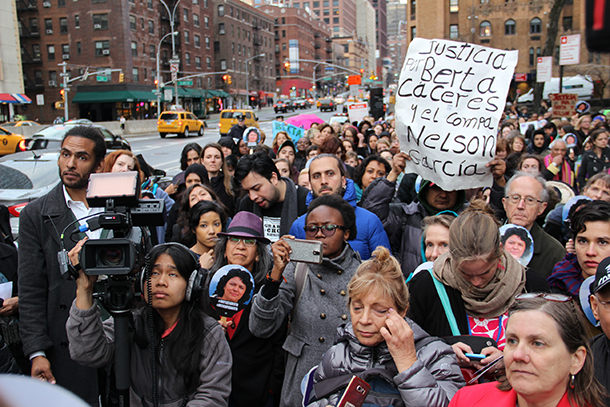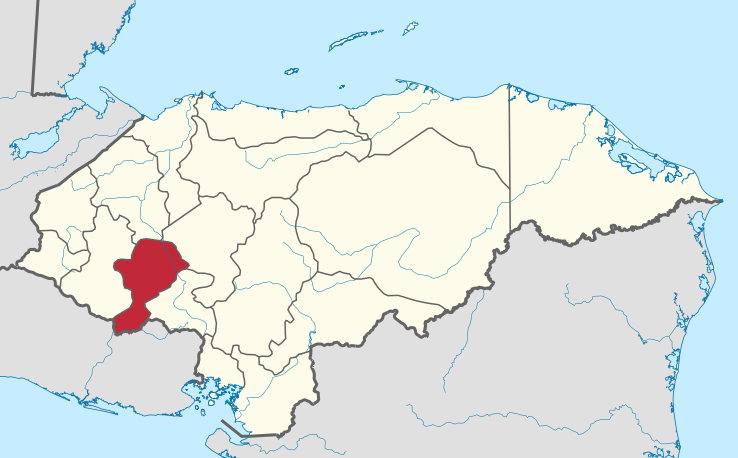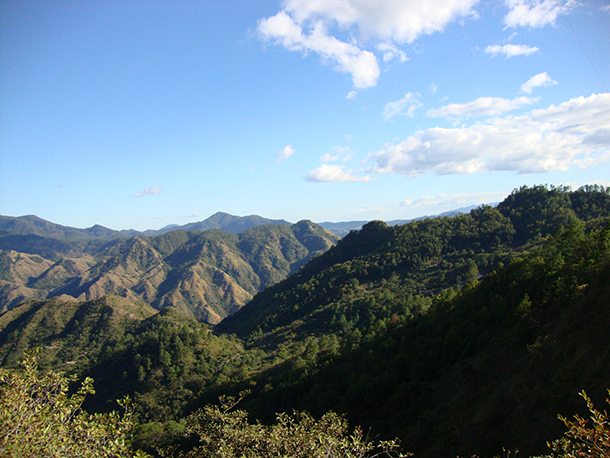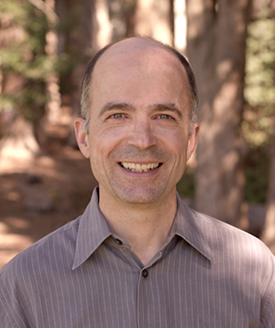Dam Funders Halt Support After Murders In Honduras
Air Date: Week of April 1, 2016

People gathered at a rally in New York City calling for justice for slain Honduran environmental activists Berta Caceres and Nelson Garcia. (Photo: Natalie Jeffers / UMWomen, Flickr CC BY-NC-ND 2.0)
Two major financiers of the Agua Zarca dam project in Honduras have suspended their financial support in the wake of the high-profile murders of Berta Cáceres and Nelson Garcia, activists who opposed the dam. Peter Bosshard of International Rivers and host Steve Curwood discuss the potential far-reaching consequences for development international aid programs.
Transcript
CURWOOD: It’s Living on Earth, I’m Steve Curwood. In March we reported on the death of Honduran environmental activist Berta Cáceres. Well, just a week after her murder, Nelson García, another activist from her group, the Council of Indigenous and Popular Organizations of Honduras or COPINH, was also killed. COPINH opposes the Agua Zarca dam project, which would have cut off Cáceres’ Lenca people from their river, and many speculate that opposition may have led to her murder. Joining us now to discuss the dam project and the murders is Peter Bosshard, Executive Director of International Rivers. Welcome to Living on Earth, Peter.
BOSSHARD: Thank you.
CURWOOD: So, first tell me about this second murder. Who was Nelson García and why was he killed?
BOSSHARD: Nelson García was a rank-and-file activist with COPINH, this organization that defends indigenous and other marginalized people in Honduras. He was supporting the local community against a land grab. 150 families were living on a plot of land that had been illegally sold by the major of the small town, Rio Lindo, and on the day that they were going to be evicted, he helped these families out, helped them to set up a protest and on the way home to his own house he was met by four gunmen and killed.

The Lenca people live in part in the Intibucá Department of Honduras, where the Agua Zarca dam is proposed to be built. (Photo: TUBS, Wikimedia Commons CC BY 2.0)
CURWOOD: What if anything did Nelson García have to do with opposition to Agua Zarca dam or other dam projects in Honduras?
BOSSHARD: In 2009, there was a military coup in Honduras and a right-wing government came to power after that, and since that time the government has sold off lands and the rights to rivers to private investors at a massive scale. The indigenous peoples who lived in these territories, they have no say in this matter even though under international law that they would have a right to free prior informed consent, kind of a veto power over projects on their territories. The Agua Zarca dam is such a private investment where a river was offered to private investors by the government against the resistance of the indigenous Lenca people, and similarly on this other river where this land grab happened where Nelson García was killed, there is plans for hydropower companies to come in and built these projects again against the resistance of the local people. It's not in the vicinity of the Agua Zarca dam, but it's the same mechanism where the natural resources are turned over to private investors against resistance of people who have lived off these resources and make good use of them for many generations.

The mountains of the Intibucá Department of Honduras (Photo: John Donaghy, Flickr CC BY-NC-ND 2.0)
CURWOOD: I understand that recently two of the major European financiers of the Agua Zarca dam project decided to pull their support. Who were they?
BOSSHARD: Two of the three main financiers of the Agua Zarca dam are public financial institutions from the Netherlands and from Finland. FMO and FinFunds, they operate with the public money to invest in supposed developing projects in southern countries. They operate almost like a private bank at arms length from the government often without too much public oversight. So particularly, FMO, the bigger among the two institutions, the Dutch financier has been involved in a series of similar projects in Guatemala, in Panama, which also have created a lot of resistance by indigenous peoples where local activists were also killed to make way for these projects so they have operated away from the limelight but they really have quite a bad track record when it comes to respecting indigenous rights and human rights more generally.
CURWOOD: Why did they pull out in this case?

El Cajón Dam is a hydroelectric power plant in Honduras and the fifth highest dam in the Americas. (Photo: Dwwhyd, Wikimedia Commons public domain)
BOSSHARD: The banks have not pulled out yet. They suspended their support after Berta and Nelson were killed, simply under the immense public pressure. My hunch is that probably the governments, particularly the Dutch government realized that this was just too embarrassing. The Netherlands and Finland typically have quite strong policies on human rights and here are these actors which operate with taxpayers’ money and become accomplices in such human rights abuses, so if we don't keep up public pressure they may well continue to fund this project, but chances are that they will have to pull out eventually.
CURWOOD: How important is their support if they eventually pull out? Would that stop the Agua Zarca project?
BOSSHARD: The two European financiers have contributed $20 million out of total loans of $44 million, so almost half of the funding. Most of the loans have not been dispersed yet. The Agua Zarca dam has not progressed very far into construction and so if they pulled out at this stage, it would be difficult for the dam builder to replace them particularly after what has happened.
CURWOOD: What about the United States? In particular, what role has USAID played in financing this or other projects like it in Honduras?

Peter Bosshard is the Interim Executive Director of International Rivers. (Photo: courtesy of International Rivers)
BOSSHARD: USAID doesn't typically fund large dams any more. They have not given any support to the Agua Zarca dam, but we noticed that they have a project where they work together with the dam builder to make agriculture more productive in the region. We think it should obviously be scrutinized after what has happened. Of course, Honduras is part of the corridor through which a lot of trucks get smuggled to the United States and so there is USAID for the Honduran military which has been an accomplice in many of these human rights violations, and so that's our main concern when it comes to the US role in Honduras.
CURWOOD: Peter Bosshard is the Executive Director of International Rivers. Thanks for joining us today.
BOSSHARD: Thank you, Steve.
Links
Finnfund statement: “Disbursements to Honduran hydropower project currently on hold”
Dutch development finance agency : “FMO suspends all activities in Honduras effective immediately”
About U.S. assistance to Honduras
Track the funding sources of Agua Zarca dam and other international projects on BankTrack
Living on Earth wants to hear from you!
Living on Earth
62 Calef Highway, Suite 212
Lee, NH 03861
Telephone: 617-287-4121
E-mail: comments@loe.org
Newsletter [Click here]
Donate to Living on Earth!
Living on Earth is an independent media program and relies entirely on contributions from listeners and institutions supporting public service. Please donate now to preserve an independent environmental voice.
NewsletterLiving on Earth offers a weekly delivery of the show's rundown to your mailbox. Sign up for our newsletter today!
 Sailors For The Sea: Be the change you want to sea.
Sailors For The Sea: Be the change you want to sea.
 The Grantham Foundation for the Protection of the Environment: Committed to protecting and improving the health of the global environment.
The Grantham Foundation for the Protection of the Environment: Committed to protecting and improving the health of the global environment.
 Contribute to Living on Earth and receive, as our gift to you, an archival print of one of Mark Seth Lender's extraordinary wildlife photographs. Follow the link to see Mark's current collection of photographs.
Contribute to Living on Earth and receive, as our gift to you, an archival print of one of Mark Seth Lender's extraordinary wildlife photographs. Follow the link to see Mark's current collection of photographs.
 Buy a signed copy of Mark Seth Lender's book Smeagull the Seagull & support Living on Earth
Buy a signed copy of Mark Seth Lender's book Smeagull the Seagull & support Living on Earth

